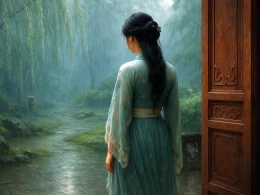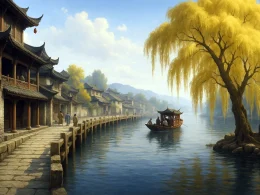You go from north to south,
From land to river mouth.
Oranges in gardens loom;
Lotus on water bloom.
The night fair's bright as day;
Outside temples boats stay.
Welcome from far and near
Would make you stay a year.
Original Poem:
「送友游吴越」
杜荀鹤
去越从吴过,吴疆与越连。
有园多种桔,无水不生莲。
夜市桥边火,春风寺外船。
此中偏重客,君去必经年。
Interpretation:
This poem was written by Du Xunhe for a friend who was about to travel to the Wu and Yue regions. Wu and Yue, located in present-day Jiangsu and Zhejiang provinces, have long been renowned for their beautiful natural landscapes and cultural heritage. Du Xunhe had personally visited this area and had witnessed its picturesque scenery. Therefore, in the poem, he offers his friend a detailed introduction to Wu and Yue, expressing his admiration and a hint of envy for the beauty of the region.
First Line: “去越从吴过,吴疆与越连。”
(Leaving Yue, passing through Wu, the boundaries of Wu and Yue are connected.)
The poet opens with a direct mention of the geographical relationship between Wu and Yue, setting the foundation for the subsequent descriptions. This line also hints that Wu and Yue are unique regions with shared natural landscapes.
Second Line: “有园多种桔,无水不生莲。”
(There are many orchards with oranges, and lotus flowers grow in every water.)
The poet uses the images of "oranges" and "lotus flowers" to highlight the distinctive features of Wu and Yue. Oranges represent the fertile land, while lotus flowers symbolize the water-rich environment. This suggests that the region is characterized by both beautiful gardens and typical water town scenery, which are the unique charms of the area.
Third Line: “夜市桥边火,春风寺外船。”
(The night market by the bridge is bustling with activity, and the boats outside the temple are gently rocked by the spring breeze.)
This line portrays the lively atmosphere of the night market and the boats outside the temple, showcasing the distinctive prosperity of the water towns in Wu and Yue. The word "fire" emphasizes the bustling and thriving market, while "spring breeze" creates a peaceful image of the boats and temples, combining warmth and serenity.
Fourth Line: “此中偏重客,君去必经年。”
(This place is especially hospitable, and my friend will surely stay for a long time.)
In the final line, the poet highlights the hospitable nature of the people in Wu and Yue. It subtly implies that the beauty of the scenery and the warmth of the local people will make the friend linger, emphasizing the deep affection the poet has for his friend and the fondness for the place.
Writing Characteristics
- Fresh and Delicate Natural Descriptions
The poet selects "oranges" and "lotus flowers" as symbols to represent the land's fertility and the beauty of the waters. These simple yet vivid images create a clear depiction of the natural characteristics of Wu and Yue. - Vivid Depiction of Local Customs
Through the descriptions of the "night market fire" and "boats outside the temple," the poet brings the lively and peaceful atmosphere of Wu and Yue to life. These portrayals of the market and temples convey the region's prosperity and the warmth of its people. - Genuine and Warm Emotions
The final line, "especially hospitable, and my friend will surely stay for a long time," not only wishes the friend well but also expresses deep affection. It conveys the poet's concern and anticipation for the friend's journey while reinforcing the warm hospitality of the region.
Overall Appreciation
"Farewell to a Friend Traveling to Wu and Yue" uses fresh natural descriptions and vivid portrayals of local customs to paint a picture of the beauty and prosperity of Wu and Yue. The poet's simple yet lively style brings to life the bustling market and tranquil waterways, emphasizing the fertile land and hospitable people of the region. The poem blends realistic depictions of the landscape with heartfelt emotion and well wishes, showcasing the poet's admiration for the scenery and his best wishes for his friend's journey. The poem is warm, fluid, and full of emotional depth, with a strong sense of humanity, making it a vivid and emotionally rich farewell poem.
Inspiration
This poem reminds us that when wishing a friend well, we can deepen the emotional expression by describing specific landmarks and cultural characteristics. By choosing concrete and symbolically rich imagery, we can more vividly and concretely convey our feelings, creating a colorful and dynamic scene for the reader. Additionally, the poet does not dwell on sadness during the farewell but instead conveys deep affection through positive and heartfelt wishes, illustrating the profound friendship between the poet and his friend.
Poem translator:
Xu Yuan-chong (许渊冲)
About the Poet:
Du Xunhe (杜荀鹤), 846-907 AD, was a native of Shidai, Anhui Province. During his long life of despondency and poverty, he was dissatisfied with the social reality and had a certain understanding of the people's sufferings. As a result, his early poems include works that satirize current events, expose social darkness and sympathize with the people. Artistically, he was a poet who named himself as a "bitter poet".












